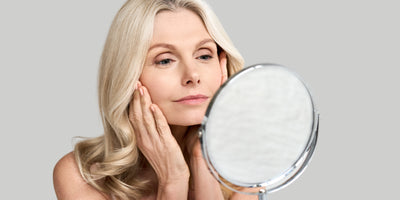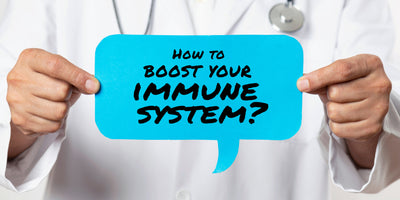
Can Astaxanthin Help Manage Menopause Symptoms and Support Women's Health?
by Ron GoedekeMenopause is an inevitable stage in every woman's life, typically occurring between the ages of 45 and 55. This transition marks the end of reproductive years, accompanied by significant changes in hormone levels, particularly a reduction in estrogen and progesterone. These hormonal fluctuations can lead to a wide range of physical and emotional symptoms, from hot flashes and night sweats to mood swings, joint pain, and changes in skin elasticity. While hormone replacement therapy (HRT) remains a common treatment, many women are seeking natural alternatives to manage these changes more gently and sustainably. One supplement that has gained attention in recent years is astaxanthin, a powerful antioxidant with numerous health benefits. But can it really help manage menopause symptoms and support overall women's health?
In this article, we'll dive deeper into the potential of astaxanthin to alleviate menopause-related symptoms, exploring the science behind its benefits for skin health, mood, heart health, and more.
What is Astaxanthin? A Powerful Antioxidant for Women's Health During Menopause
Astaxanthin is a naturally occurring carotenoid pigment that belongs to a larger class of phytochemicals responsible for the vibrant colors in plants and animals. It’s found in microalgae, seafood such as salmon and shrimp, and certain types of krill. Often referred to as the “king of antioxidants,” astaxanthin is known for its remarkable ability to combat oxidative stress—an imbalance between free radicals and antioxidants in the body that leads to cellular damage.
This antioxidant potency is what makes astaxanthin particularly valuable for women during menopause. The drop in estrogen levels that occurs during this time can increase oxidative stress in the body, contributing to many of the unpleasant symptoms associated with menopause, including fatigue, hot flashes, and aging skin. Unlike other antioxidants, which can sometimes become unstable in the body, astaxanthin remains active and continues to neutralise free radicals. This unique stability may give it an edge over other antioxidant supplements, such as vitamin C or beta-carotene, particularly when it comes to long-term use.
For women navigating menopause, introducing a potent antioxidant like astaxanthin into their regimen could help mitigate some of the cellular damage caused by hormonal shifts. In fact, studies have shown that astaxanthin is up to 6,000 times more potent than vitamin C, 550 times stronger than vitamin E, and 40 times more powerful than beta-carotene in its antioxidant capacity. This makes it a highly effective tool for fighting the oxidative stress that often exacerbates menopause symptoms.
Astaxanthin and Hormonal Balance: Can It Help with Menopause Symptoms?

During menopause, the body experiences a dramatic decrease in the production of hormones like estrogen and progesterone, which play key roles in regulating various functions in the body. These hormonal changes often lead to a range of symptoms including hot flashes, night sweats, mood swings, and even insomnia. While astaxanthin is not a direct hormone replacement, its role in reducing oxidative stress may help support the body’s natural hormone regulation during this time.
Oxidative stress can impair the function of the glands that produce hormones, including the ovaries and adrenal glands, potentially worsening the hormonal imbalances that women experience during menopause. Astaxanthin’s ability to reduce oxidative stress may help protect these glands, ensuring that they can continue to function more optimally during the menopausal transition. Although more research is needed, there is growing evidence that reducing oxidative stress can positively impact the body’s ability to regulate hormones.
Furthermore, astaxanthin may play a role in supporting the adrenal glands, which take on the responsibility of producing small amounts of estrogen after the ovaries stop functioning. These glands are also responsible for producing cortisol, the stress hormone, which can be elevated during menopause due to increased stress and anxiety. By protecting the adrenal glands from oxidative damage, astaxanthin may help maintain a healthier balance of estrogen and cortisol, potentially reducing the severity of menopause symptoms such as fatigue, mood swings, and stress.
Reducing Menopausal Hot Flashes: How Astaxanthin's Antioxidant Properties May Help
Hot flashes are one of the most well-known and disruptive symptoms of menopause, affecting up to 75% of women going through this transition. These sudden feelings of intense heat, often followed by sweating, can be uncomfortable and embarrassing. The exact cause of hot flashes is not fully understood, but they are believed to be related to changes in the body's thermoregulation system, which is influenced by fluctuating hormone levels. Oxidative stress may play a role in this process by impairing the body's ability to regulate temperature.
Astaxanthin, with its powerful antioxidant properties, may help to mitigate the oxidative stress that contributes to hot flashes. By neutralising free radicals and reducing inflammation, astaxanthin could help stabilise the body’s internal temperature regulation. While studies specifically on astaxanthin and hot flashes are still limited, its general anti-inflammatory and antioxidant effects suggest that it may provide relief for women experiencing this symptom.
In addition to its potential to reduce hot flashes, astaxanthin’s overall support for cardiovascular health could play a role in alleviating other vasomotor symptoms, such as night sweats and chills. These symptoms, like hot flashes, are often linked to changes in the body’s blood vessels and circulation, areas where astaxanthin’s anti-inflammatory benefits could be particularly helpful. For women seeking a natural alternative to manage their hot flashes, astaxanthin offers a promising option, especially when combined with other lifestyle changes such as a balanced diet and regular exercise.
Astaxanthin and Skin Health: Combating Menopause-Related Skin Aging
One of the most visible effects of menopause is the impact it has on the skin. As estrogen levels decline, so does the production of collagen, a protein that provides structure and elasticity to the skin. This reduction in collagen, along with a decrease in skin hydration, can lead to wrinkles, dryness, and sagging. For many women, these changes can be distressing and contribute to feelings of aging.
Astaxanthin has gained significant attention in the skincare world for its ability to protect the skin from oxidative damage and improve its overall appearance. Its antioxidant properties can help combat the damage caused by environmental factors such as UV radiation and pollution, which can further exacerbate the aging process. Studies have shown that astaxanthin can increase skin hydration, improve elasticity, and reduce the appearance of fine lines and wrinkles.
For menopausal women dealing with skin aging, incorporating astaxanthin into their routine—either through supplements or topical products—could help rejuvenate their skin and slow the signs of aging. One study found that participants who took astaxanthin supplements for eight weeks saw significant improvements in skin texture, moisture levels, and elasticity, highlighting its potential as a natural anti-aging treatment. Additionally, astaxanthin's ability to protect skin from sun damage may be especially beneficial for women during menopause, as hormonal changes can make the skin more sensitive to UV rays.
Managing Inflammation During Menopause with Astaxanthin
Inflammation is a major underlying factor in many of the symptoms associated with menopause, from joint pain and muscle stiffness to an increased risk of chronic conditions like heart disease and diabetes. As estrogen levels decline, the body’s natural anti-inflammatory defenses weaken, leading to an increase in inflammation. This can manifest as joint pain, particularly in the hands, knees, and hips, as well as muscle soreness and general discomfort.
Astaxanthin is one of the most potent natural anti-inflammatory agents available, with studies showing that it can inhibit the production of pro-inflammatory compounds such as cytokines and prostaglandins. These compounds play a key role in the body’s inflammatory response, and by reducing their production, astaxanthin can help ease the inflammation that leads to joint and muscle pain. This makes it an excellent option for women dealing with the aches and pains that often accompany menopause.
In addition to reducing inflammation, astaxanthin’s antioxidant properties may help protect the body’s tissues from damage caused by oxidative stress, which is often linked to inflammation. By neutralising free radicals, astaxanthin can help reduce the overall burden of oxidative stress in the body, potentially preventing the development of chronic inflammatory conditions. For women looking to maintain an active lifestyle during menopause, incorporating astaxanthin into their regimen could help support joint health and mobility.
Can Astaxanthin Improve Mood and Cognitive Function During Menopause?
Mood swings, anxiety, and brain fog are common symptoms of menopause, often resulting from the hormonal fluctuations that occur during this time. The decline in estrogen levels can affect neurotransmitter production, leading to changes in mood, memory, and overall cognitive function. Many women report feeling more irritable, forgetful, or mentally fatigued during menopause, which can significantly impact their quality of life.
Astaxanthin’s neuroprotective properties offer a potential solution to these cognitive challenges. Research has shown that astaxanthin can cross the blood-brain barrier, where it exerts its antioxidant effects on brain cells, protecting them from oxidative damage. This is particularly important during menopause, as oxidative stress in the brain can contribute to memory loss, difficulty concentrating, and mood swings. By reducing this oxidative stress, astaxanthin may help preserve cognitive function and improve mental clarity.
In addition to its antioxidant benefits, astaxanthin may also support neurotransmitter balance by enhancing the activity of dopamine, a neurotransmitter involved in mood regulation. Some studies suggest that astaxanthin may have antidepressant-like effects, making it a potential natural treatment for menopausal women experiencing anxiety or depression. By supporting both brain health and mood stability, astaxanthin could help women navigate the emotional ups and downs of menopause more easily.
Supporting Heart Health During Men
Cardiovascular health becomes an increasing concern for women as they enter menopause. Estrogen has a protective effect on the heart and blood vessels, so when its levels decline, the risk of heart disease, high blood pressure, and cholesterol imbalances increases. In fact, heart disease is the leading cause of death among postmenopausal women, making it crucial to take proactive steps to support cardiovascular health during this time.
Astaxanthin has been shown to have a number of cardiovascular benefits, making it an excellent supplement for women looking to protect their heart health during menopause. Studies have found that astaxanthin can improve blood lipid profiles by lowering levels of LDL (bad) cholesterol while increasing levels of HDL (good) cholesterol. This helps reduce the risk of atherosclerosis, a condition characterised by the buildup of plaque in the arteries, which can lead to heart attacks and strokes.
In addition to its cholesterol-lowering effects, astaxanthin has been shown to improve blood flow and reduce blood pressure, both of which are important factors in maintaining cardiovascular health. Its anti-inflammatory properties also help protect the heart and blood vessels from damage caused by chronic inflammation, which is a major contributor to heart disease. For women going through menopause, incorporating astaxanthin into their routine could provide a natural way to support heart health and reduce the risk of cardiovascular complications.
Astaxanthin’s Potential in Supporting Bone Health for Menopausal Women
Osteoporosis and bone density loss are significant concerns for postmenopausal women. Estrogen plays a key role in maintaining bone strength, so when its levels drop during menopause, women become more susceptible to bone fractures and conditions like osteoporosis. This makes bone health a top priority for women during and after menopause.
While calcium and vitamin D are the most commonly recommended supplements for bone health, astaxanthin’s antioxidant properties may also offer benefits. Oxidative stress has been linked to bone loss, as it can impair the activity of osteoblasts, the cells responsible for building and maintaining bone tissue. By reducing oxidative stress, astaxanthin may help protect these cells and preserve bone density.
In addition to its antioxidant effects, astaxanthin’s anti-inflammatory properties may also support bone health by reducing inflammation in the bones and joints. This can help prevent conditions like arthritis, which are more common in postmenopausal women. For women looking to maintain strong, healthy bones as they age, astaxanthin could be a valuable addition to their supplement routine, especially when combined with other bone-supporting nutrients like calcium, vitamin D, and magnesium.
Astaxanthin and Eye Health: Protecting Vision During Menopause
Vision problems, including dry eyes, blurry vision, and an increased risk of cataracts and macular degeneration, are common during menopause. These issues are often linked to hormonal changes, which can affect the health of the eyes and lead to increased oxidative stress in the eye tissues.
Astaxanthin has been extensively studied for its benefits to eye health, making it a promising supplement for women experiencing vision problems during menopause. Its ability to neutralise free radicals in the eyes helps protect the delicate tissues from oxidative damage, which is a major contributor to age-related eye conditions. Studies have shown that astaxanthin can improve visual acuity, reduce eye fatigue, and protect against the development of cataracts and macular degeneration.
In addition to its antioxidant benefits, astaxanthin also has anti-inflammatory effects, which can help alleviate symptoms of dry eyes, a common complaint among menopausal women. By reducing inflammation in the eyes, astaxanthin can improve tear production and enhance overall eye comfort. For women looking to protect their vision during menopause, astaxanthin offers a natural solution that can help maintain eye health and prevent age-related vision problems.
Incorporating Astaxanthin into Your Diet: A Guide for Women in Menopause
For women interested in adding astaxanthin to their daily routine, there are several ways to incorporate this powerful antioxidant into their diet. Astaxanthin is naturally found in seafood like salmon, trout, shrimp, and krill, with wild-caught salmon being one of the richest dietary sources. However, to achieve a therapeutic dose, supplementation is often the most effective option.
Astaxanthin supplements are widely available in capsule form, with typical dosages ranging from 4 to 12 mg per day. When choosing an astaxanthin supplement, it’s important to look for high-quality, natural astaxanthin sourced from algae, as this is the most potent and bioavailable form. Many supplements combine astaxanthin with other antioxidants or nutrients to enhance its overall benefits.
In addition to supplements, there are also topical skincare products that contain astaxanthin, offering a direct way to support skin health during menopause. Whether taken internally or applied topically, astaxanthin can provide a range of benefits for women navigating the challenges of menopause, from reducing hot flashes and improving skin elasticity to supporting heart, bone, and cognitive health.
Summary
- Astaxanthin is a potent antioxidant found in algae, seafood, and supplements, known for its ability to combat oxidative stress.
- Oxidative stress during menopause can worsen symptoms like fatigue, skin aging, and hot flashes, and astaxanthin helps neutralise free radicals to reduce these effects.
- Astaxanthin may support hormonal balance by protecting hormone-producing glands, potentially alleviating symptoms like hot flashes, night sweats, and mood swings.
- It could reduce hot flashes by stabilising the body's temperature regulation and improving overall cardiovascular health.
- Astaxanthin improves skin health by increasing hydration, elasticity, and reducing wrinkles, making it a natural anti-aging ally for menopausal skin changes.
- Its anti-inflammatory properties help manage joint pain and muscle stiffness, common issues during menopause, by reducing pro-inflammatory compounds in the body.
- Astaxanthin may improve mood and cognitive function during menopause by reducing oxidative stress in the brain, potentially stabilising neurotransmitters like dopamine and enhancing mental clarity.
- It supports heart health by lowering bad cholesterol, improving blood flow, and reducing inflammation, which are critical during the post-menopausal increase in heart disease risk.
- Astaxanthin’s antioxidant effects may protect bone health by reducing oxidative stress and inflammation that can lead to bone density loss during menopause.
- It benefits eye health by protecting against oxidative damage, helping alleviate dry eyes, and reducing the risk of age-related eye conditions like cataracts and macular degeneration.
- Astaxanthin can be incorporated into the diet through seafood or supplements, with supplements offering a convenient way to achieve therapeutic doses.
Astaxanthin Information
For more everything you need to know about Astaxanthin, check out our comprehensive information page here.
Astaxanthin
We’ve created an astaxanthin supplement containing 6mg of astaxanthin per softgel. To learn more about our astaxanthin, check out the product page here.

Related Articles

Author
Ron Goedeke MD, BSc Hons MBChB, FNZCAM
Dr. Ron Goedeke, an expert in the domain of functional medicine, dedicates his practice to uncovering the root causes of health issues by focusing on nutrition and supplement-based healing and health optimisation strategies. An esteemed founding member of the New Zealand College of Appearance Medicine, Dr. Goedeke's professional journey has always been aligned with cutting-edge health concepts.
Having been actively involved with the American Academy of Anti-Aging Medicine since 1999, he brings over two decades of knowledge and experience in the field of anti-aging medicine, making him an eminent figure in this evolving realm of healthcare. Throughout his career, Dr. Goedeke has been steadfast in his commitment to leverage appropriate nutritional guidance and supplementation to encourage optimal health.
This has allowed him to ascend as one of the most trusted authorities in the arena of nutritional medicine in New Zealand. His expertise in the intricate relationship between diet, nutritional supplements, and overall health forms the backbone of his treatment approach, allowing patients to benefit from a balanced and sustainable pathway to improved wellbeing.
- Astaxanthin: A mechanistic review on its biological activities and health benefits by S Fakhri, F Abbaszadeh, L Dargahi, M Jorjani
- Protective effects of astaxanthin on skin deterioration by K Tominaga, N Hongo, M Fujishita, Y Takahashi, Y Adachi
- Administration of natural astaxanthin increases serum HDL-cholesterol and adiponectin in subjects with mild hyperlipidemia by Hiroshi Yoshida, Hidekatsu Yanai, Kumie Ito, Yoshiharu Tomono, Takashi Koikeda, Hiroki Tsukahara, Norio Tada
- Astaxanthin is neuroprotective in an aged mouse model of Parkinson’s disease by Beth Grimmig, Lauren Daly, Meena Subbarayan, Ched Hudson, Robert Williamson, Kevin Nash and Paula C. Bickford
Disclaimer: The information provided is for educational purposes only and does not constitute medical advice. Always seek the advice of your physician or qualified healthcare provider with any questions or concerns about your health. Never disregard or delay seeking medical advice because of something you have heard or read on this website.
Last updated on the 7th of October 2024




